Tara Chevrestt's Blog, page 53
June 25, 2014
Maggie's Wars by Phil Pisani
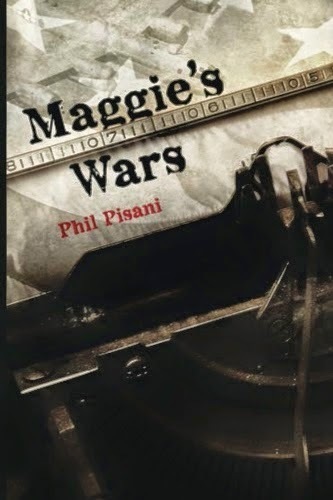 "...a woman had to use every talent, every God-bestowed attribute. Every day was a battle, and I needed a better weapon."
"...a woman had to use every talent, every God-bestowed attribute. Every day was a battle, and I needed a better weapon.""You're like all men: full of it, hiding behind stupid grins and scared of women doing a better job!"
I didn't really like this book. I thought I would. It's about a woman reporter trying to make it in a male-dominated field--not only reporting but reporting the war. It's nearing the end of WWII and she wants to go to the front, but frankly, the same thing I admire about her--her desire to prove women can perform just fine as reporters at the front line, also irritated me. She was too excited about seeing war. She went so far as to heartlessly say things like, "I hope it isn't over before I get there!" Not a direct quote, but you know what I mean.
Kinda reminded me of the beginning of the recent Iraq war. They showed all these fresh-out-of-highschool girls about to go to war, and they were gushing with excitement. Um, this is war. People are going to die. This is not a fun trip to Paris where you can paint your toenails.
Moving on.
I also didn't care for the fact half of it's from a male POV, her mob lover, Johnny, even though his stuff was actually more interesting. (Maggie seems to just complain and have sex.) I don't doubt for a minute the U.S. gov't recruited mob men at some point in the war and gave them special covert assignments. Anything is possible. He gets into some nitty, gritty war escapades too.
I appreciate one thing for sure: how it showed us the end of the war may not have been all we thought it was, that perhaps there was some loss of control on our side. It's sad, but it happens. It's something to think about.
But Maggie...she never grew on me, just annoyed the heck out of me. At one point she even opens a gate to a concentration camp, struts inside, and just randomly kisses a man? Huh? That was told from the dude's POV and I feel like I totally missed something. Who was she diddling this time?
You see, Maggie doesn't make it by her brains or wits alone. She has to sleep with men or give hand jobs under tables. I'm all for women's liberation and sexual freedom but to just screw a handsome reporter you met not two minutes before? Seriously? Glad it worked out for them, but it was at this point...at 62% ,with the war over, and Maggie just jumping into bed with another man, that I just decided I'd had it. Perhaps Maggie becomes a terrific person in that last 40% but too little too late for me.
As for the writing itself, it's okay. I still feel like I missed things between the changing of POVs and I got tired at some points of the eyes meeting and the smiling, but it's not half bad.
I borrowed this via Amazon Prime.

Published on June 25, 2014 00:00
June 24, 2014
Daughter of the Gods: A Novel of Ancient Egypt by Stephanie Thornton
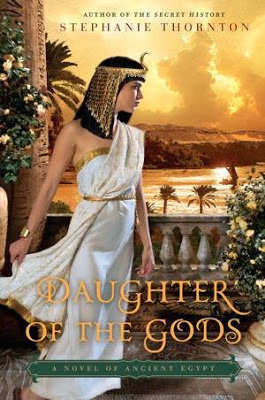 Too often, historical fiction novels about women who held a position of power focus on not what they did or accomplished for their kingdom/country, but who they slept with or how many lovers they had.
Too often, historical fiction novels about women who held a position of power focus on not what they did or accomplished for their kingdom/country, but who they slept with or how many lovers they had.That's why I was pleasantly surprised by this book. Oh--Hatshepsut has a lover, of course, but while the romance is ongoing throughout the novel, the story also tells us about the things Hatshepsut did--went into battle against the Nubians, ordered executions, heard peasants' complaints, funded a three-year expedition to bring Egypt new wealth and broker more trade.
And all the while, her throne is threatened from here and there, and she must sacrifice much to ensure her country does not see civil war.
And she builds tombs and obelisks. Lots of them. To be frank, this was the only downside to the story for me--all the details about tombs and stuff. I'm afraid I don't have a strong interest in pyramids or architecture. That's just a personal thing. Frankly, if I were in her position, I'd be doing more for the people and less worried about putting a ton of wealth into a pyramid, but this was a very different culture and a very superstitious one. The superstitions were interesting to me--how she wrapped a heart to ensure someone went to the "Field of Reeds" and all the bits about gods and goddesses were intriguing, especially when Hatshepsut has a little "incident" with what could be construed as an angry god.
I enjoyed this story though. We have a very strong woman here, and the novel is a great tribute to her. The romance didn't overpower the history or the details of her reign. Stephanie Thornton is def an author I will be watching for more from. I'd also like to add that I've attempted quite a few novels about this female pharaoh and this is the first one I've read in its entirity. I did not enjoy the others for whatever reasons, mostly due to boredom or writing style, so I really feel a good job was done here. People who have never read or heard of Hatshepsut will learn a lot from this.
I won this book on Historical Fiction Virtual Book Tours.

Published on June 24, 2014 00:00
June 23, 2014
The Ice Cream Queen of Orchard Street by Susan Jane Gilman

"With 17 percent butterfat, you could make an ice cream out of dog sh*t and everyone would think it was heaven."
I LOVED this book. It made me laugh, surprised me, made me sad at times, taught me things, and just overall completely entranced me. Such an honest narrator! If you didn't know her entire story, you would think some of the things she does or says is bad, but knowing the entire story, I found myself rooting for her all the way. This also made me think of how quick we are to judge in real life...how quickly we say, "That person is so wrong! That person is doing bad..." before we know the full story. Food for thought, eh?
This woman, this ice cream queen, former Jewish immigrant who grew up crippled, with an Italian family and became Catholic and married a handsome man and struggled to obtain the American dream...she just tells her story, and she tells it like it is. There's no painting herself into a saint, no pretending to be someone she's not. From a ship on the way to America, to ice cream parlors, to heartbreak, to war, to motherhood, we're with her all the way, and every minute is interesting.
People were not always kind to her. Yet I think some of my favorite bits were when she was growing up on the streets on New York. Her own family was cruel. It was different times. But yet, it makes her who she is, who came to be, a tough woman, business savvy. I can see some people being put off by this heroine, her actions, her brutal honesty, but I felt nothing but sympathy for her at first, and later, pride. Perhaps because I've grown up with my own disability, I saw where she was coming from more than others will.
 Giambattista Della Porta
Giambattista Della PortaFrom Wiki CommonsAnd along the way, I learned a ton of things, like who invented ice cream: Giambattista Della Porta, an Italian scholar who made frozen wine of sorts.
All the WWII books I've read, you wouldn't think I'd learn something new, especially from an ice cream queen, right?
Wrong.
I had no idea an island called Ulithi existed until reading this.
Within a single month in the autumn of 1944, the United States converts this blip (the island) into the largest secret naval base in the world.
And you know what? They had an ice cream barge! And I double checked this. It's true. This author knows her ice cream history. Off the coast of this island--oh let the book say it:
This ice cream barge in Ulithi was commissioned to be the world's biggest "floating ice cream parlor." Made of concrete, it did not even have an engine. It was a refrigerated leviathan that had to be towed across the Pacific.
As I said above, this turned out to be true and according to some data I found about the island mentioned, the ice cream barge made 500 gallons a shift.
The story takes us from the early 1900s, before freezers, to a time of Polio Pioneers. Did you know it was said that sugar and things like ice cream contributed to the disease?
Long review short, this narrator shares not only her ups and downs, her goods and bads, her fears, accomplishments, and shortcomings, but also American history. And to me there was also a moral, that success and money doesn't always mean happiness, nor does it erase past hurts, or make you feel more loved.
It's a long read. I think bits toward the end could have been cut back. The drunken Lilian grew a bit tedious, but it was probably meant to be that way.
But it's a story of success, downfall, of people pursuing the American dream despite the most negative of odds. And in my opinion, it's a winner of a book.
Don't believe me? Check it out for yourself. At THIS time, the first three chapters are free on Kindle.
I received this via Netgalley.

Published on June 23, 2014 00:00
June 22, 2014
What's Really Interesting About George Sand?
I confess that I have never read George Sand's work and couldn't name a single book by her until very recently. I only knew about the prominent men in her life. Perhaps this is why Anna Faktorovich decided to call her novelized version of the life of this author The Romances of George Sand. Yet it's really sad when what we most remember about a feminist writer is her romantic entanglements with men. Now that I've read Faktorovich's book, I am here to tell you that the romances were the least interesting aspect of George Sand's life.
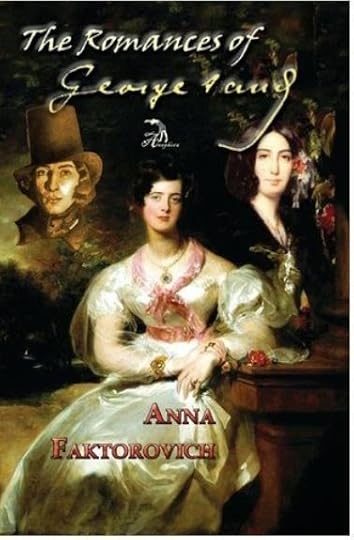
One personal fact that I had previously known about George Sand was that she had cross-dressed. The image on the upper left of the cover depicts George Sand cross-dressed as a man. The reason why women who cross-dressed interest me is because historically women engaged in this practice because they wanted to involve themselves in activities that weren't considered acceptable for women. According to Faktorovich, George Sand's mother first dressed her as a boy because she wanted her four year old daughter to accompany her father, an officer in Napoleon's army, when he met with important people. It apparently was considered appropriate for a four year old son to see what his father did, but not his daughter. Faktorovich also tells us that the French fairy tale "Belle-Belle ou Le Chevalier Fortune" influenced George Sand a great deal when she was a child. It was about a girl who dressed as a man in order to become a soldier in the King's army. Here is an English translation of this fairy tale that is ascribed to Madame D'Aulnoy (1650-1705).
George Sand came from a privileged background. She was the heir to her grandmother's estate, Nohan. I was amazed to learn that George Sand's tutor, Deschartres, who was a physician, taught her about medicine and other sciences. He also utilized her as an assistant for amputations and other types of surgeries. After Deschartres death, she stepped into his duties as a physician to the local peasants providing free medical care to them. Because she wanted to find a source of independent income, she wondered if wealthier patients would pay her. When she broached the concept to wealthy individuals of her acquaintance, they laughed at the idea of a woman physician. If she had been born somewhat later, a medical career could have been a real possibility for her. In 1875, the year before George Sand died, Madeleine Brès became the first female physician in France. See Doctors' Wives and Women Doctors: Imagining Medical-Scientific Women in Early Twentieth Century France by Martha L. Hildreth which deals with the struggle of Frenchwomen for recognition in scientific fields such as medicine.
Sand was also a political activist. She wrote political articles for left wing newspapers such as Le Figaro which was named after the revolutionary Barber of Seville created by the radical 18th century French playwright Pierre-Augustin Caron de Beaumarchais. Sand's novel Engelhard dealing with a man who wanted to kill Napoleon caused her to be placed under police surveillance. Horace, another of her novels, was rejected by her publisher for being too radical. So she went indie. She and two other radical authors started publishing a journal called The Independent Review where she serialized both Horace and a later novel of hers called Consuelo. Now I'd definitely like to know what it was about Horace that was considered too radical for publication. It's too bad that Faktorovich doesn't tell us.
Faktorovich also doesn't give us an author's note distinguishing between fact and fiction in her novel. She tells us what her sources were, but she doesn't make clear to her readers exactly why she chose to publish this as a novel. The book is written almost entirely in third person narrative like a biography. It also contains digressions by the author in which she gives her opinions on various matters which would be more appropriate in a work of scholarship than in a work of fiction.
In conclusion, I actually would have liked The Romances of George Sand better if Faktorovich had called this book a biography of George Sand. I was very interested in a large portion of the content, but I don't think much of it as a novel. One of the reasons why the romance aspect didn't work so well for me was because I didn't think that Faktorovich wrote especially good sex scenes. They felt inauthentic and sometimes poorly motivated from a character perspective. I didn't always understand why George Sand was reacting the way she did. I like to see characterization that is more solid in fiction.


One personal fact that I had previously known about George Sand was that she had cross-dressed. The image on the upper left of the cover depicts George Sand cross-dressed as a man. The reason why women who cross-dressed interest me is because historically women engaged in this practice because they wanted to involve themselves in activities that weren't considered acceptable for women. According to Faktorovich, George Sand's mother first dressed her as a boy because she wanted her four year old daughter to accompany her father, an officer in Napoleon's army, when he met with important people. It apparently was considered appropriate for a four year old son to see what his father did, but not his daughter. Faktorovich also tells us that the French fairy tale "Belle-Belle ou Le Chevalier Fortune" influenced George Sand a great deal when she was a child. It was about a girl who dressed as a man in order to become a soldier in the King's army. Here is an English translation of this fairy tale that is ascribed to Madame D'Aulnoy (1650-1705).
George Sand came from a privileged background. She was the heir to her grandmother's estate, Nohan. I was amazed to learn that George Sand's tutor, Deschartres, who was a physician, taught her about medicine and other sciences. He also utilized her as an assistant for amputations and other types of surgeries. After Deschartres death, she stepped into his duties as a physician to the local peasants providing free medical care to them. Because she wanted to find a source of independent income, she wondered if wealthier patients would pay her. When she broached the concept to wealthy individuals of her acquaintance, they laughed at the idea of a woman physician. If she had been born somewhat later, a medical career could have been a real possibility for her. In 1875, the year before George Sand died, Madeleine Brès became the first female physician in France. See Doctors' Wives and Women Doctors: Imagining Medical-Scientific Women in Early Twentieth Century France by Martha L. Hildreth which deals with the struggle of Frenchwomen for recognition in scientific fields such as medicine.
Sand was also a political activist. She wrote political articles for left wing newspapers such as Le Figaro which was named after the revolutionary Barber of Seville created by the radical 18th century French playwright Pierre-Augustin Caron de Beaumarchais. Sand's novel Engelhard dealing with a man who wanted to kill Napoleon caused her to be placed under police surveillance. Horace, another of her novels, was rejected by her publisher for being too radical. So she went indie. She and two other radical authors started publishing a journal called The Independent Review where she serialized both Horace and a later novel of hers called Consuelo. Now I'd definitely like to know what it was about Horace that was considered too radical for publication. It's too bad that Faktorovich doesn't tell us.
Faktorovich also doesn't give us an author's note distinguishing between fact and fiction in her novel. She tells us what her sources were, but she doesn't make clear to her readers exactly why she chose to publish this as a novel. The book is written almost entirely in third person narrative like a biography. It also contains digressions by the author in which she gives her opinions on various matters which would be more appropriate in a work of scholarship than in a work of fiction.
In conclusion, I actually would have liked The Romances of George Sand better if Faktorovich had called this book a biography of George Sand. I was very interested in a large portion of the content, but I don't think much of it as a novel. One of the reasons why the romance aspect didn't work so well for me was because I didn't think that Faktorovich wrote especially good sex scenes. They felt inauthentic and sometimes poorly motivated from a character perspective. I didn't always understand why George Sand was reacting the way she did. I like to see characterization that is more solid in fiction.

Published on June 22, 2014 00:00
June 21, 2014
The Reading Radar 6/21/2014
Let's see what's set my to-read list toppling this week...
 First, spotted on Historical Novel Review, Ghostwritten by Isabel Wolff is on the wishlist. Note to publisher: I wish it was on Kindle.
First, spotted on Historical Novel Review, Ghostwritten by Isabel Wolff is on the wishlist. Note to publisher: I wish it was on Kindle.
A childhood mistake. A lifetime of regrets.
Jenni is a ‘ghost’: she writes the lives of other people. It’s a job that suits her well: still haunted by a childhood tragedy, she finds it easier to take refuge in the memories of others rather than dwell on her own.
Jenni has an exciting new commission, and is delighted to start working on the memoirs of a Dutchwoman, Klara. As a child in the Second World War, Klara was interned in a camp on Java during the Japanese occupation – she has an extraordinary story of survival to tell.
But as Jenni and Klara begin to get to know each other, Jenni begins to do much more than shed light on a neglected part of history. She is being forced to examine her own devastating memories, too. But with Klara’s help, perhaps this is finally the moment where she will be able to lay the ghosts of her own past to rest?
***
 Spotted on Passages to the Past, Maggie's Wars by Phil Pisani def grabbed my interest and made the lists.
Spotted on Passages to the Past, Maggie's Wars by Phil Pisani def grabbed my interest and made the lists.
Combatting wars on two fronts - one of fame and the other love - Maggie Hogan never wavers as a rare woman reporter on the battlefields of World War II, the Nuremburg Trials and the beginnings of the cold war. But she makes the mistake of falling for an officer, complicating her ambitions. Learn of what one woman feels she must do in order to make it in a man's world, no matter what. Maggie's Wars is a story about the ultimate battle between love and prestige, and how you can't win them both.
***
 The Cure for Dreaming by Cat Winters has sparked my interest after I saw it on Netgalley. It had me at suffragist...
The Cure for Dreaming by Cat Winters has sparked my interest after I saw it on Netgalley. It had me at suffragist...
Olivia Mead is a headstrong, independent girl—a suffragist—in an age that prefers its girls to be docile. It’s 1900 in Oregon, and Olivia’s father, concerned that she’s headed for trouble, convinces a stage mesmerist to try to hypnotize the rebellion out of her. But the hypnotist, an intriguing young man named Henri Reverie, gives her a terrible gift instead: she’s able to see people’s true natures, manifesting as visions of darkness and goodness, while also unable to speak her true thoughts out loud. These supernatural challenges only make Olivia more determined to speak her mind, and so she’s drawn into a dangerous relationship with the hypnotist and his mysterious motives, all while secretly fighting for the rights of women. Winters breathes new life into history once again with an atmospheric, vividly real story, including archival photos and art from the period
throughout.
***
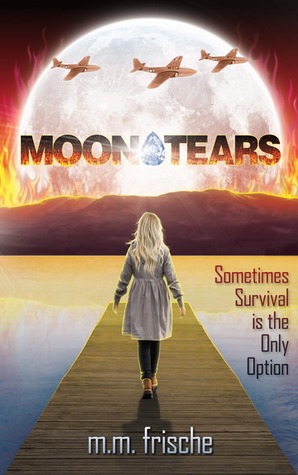 Spotted on Goodreads Giveaways, this one mentions Amelia Earhart, though I don't quite know how aviation comes into it. It's a WWII novel, a YA, and interests me enough that I entered. Moon Tears by M.M. Frische. It's on my wishlist, watch-for list. I want to know more about it.
Spotted on Goodreads Giveaways, this one mentions Amelia Earhart, though I don't quite know how aviation comes into it. It's a WWII novel, a YA, and interests me enough that I entered. Moon Tears by M.M. Frische. It's on my wishlist, watch-for list. I want to know more about it.
1941. War. It's coming. It takes your father. It takes your mother. Life will never be the same. Not for Lou Davis.
When fog requires Japanese dignitaries to reroute their flight from San Francisco to Claret Lake, fourteen-year-old Lou becomes suspicious about the direction of the war. Two weeks later her dreams of becoming a pilot are ripped away when Pearl Harbor is attacked and an error in the 1940 census results in every male over eighteen being drafted and all the women being forced to work in factories on the coast.
Lou and her asthma are left behind—and in charge. She has a secret crush on the oldest boy left in Claret Lake, but after her parents are ripped away from her, she feels alone and abandoned. Running a town full of unruly kids is worse than a full-blown asthma attack, and the only thing she sees looming on the horizon is the enemy’s plane and a boatload of disaster. How is she supposed to save a whole town when harsh winters descend, food becomes scarce, and the enemy threatens to destroy everything she has fought so hard to protect?
Then Lou remembers the ancient legend…the legend of the moon tears. Staking her town’s survival on lore from the past, she channels her inner Amelia Earhart and takes off toward an unknown future.
Based on true events, Moon Tears is a coming-of-age tale—a tale of war, a tale of loss, a tale of survival.
 First, spotted on Historical Novel Review, Ghostwritten by Isabel Wolff is on the wishlist. Note to publisher: I wish it was on Kindle.
First, spotted on Historical Novel Review, Ghostwritten by Isabel Wolff is on the wishlist. Note to publisher: I wish it was on Kindle.A childhood mistake. A lifetime of regrets.
Jenni is a ‘ghost’: she writes the lives of other people. It’s a job that suits her well: still haunted by a childhood tragedy, she finds it easier to take refuge in the memories of others rather than dwell on her own.
Jenni has an exciting new commission, and is delighted to start working on the memoirs of a Dutchwoman, Klara. As a child in the Second World War, Klara was interned in a camp on Java during the Japanese occupation – she has an extraordinary story of survival to tell.
But as Jenni and Klara begin to get to know each other, Jenni begins to do much more than shed light on a neglected part of history. She is being forced to examine her own devastating memories, too. But with Klara’s help, perhaps this is finally the moment where she will be able to lay the ghosts of her own past to rest?
***
 Spotted on Passages to the Past, Maggie's Wars by Phil Pisani def grabbed my interest and made the lists.
Spotted on Passages to the Past, Maggie's Wars by Phil Pisani def grabbed my interest and made the lists.Combatting wars on two fronts - one of fame and the other love - Maggie Hogan never wavers as a rare woman reporter on the battlefields of World War II, the Nuremburg Trials and the beginnings of the cold war. But she makes the mistake of falling for an officer, complicating her ambitions. Learn of what one woman feels she must do in order to make it in a man's world, no matter what. Maggie's Wars is a story about the ultimate battle between love and prestige, and how you can't win them both.
***
 The Cure for Dreaming by Cat Winters has sparked my interest after I saw it on Netgalley. It had me at suffragist...
The Cure for Dreaming by Cat Winters has sparked my interest after I saw it on Netgalley. It had me at suffragist...Olivia Mead is a headstrong, independent girl—a suffragist—in an age that prefers its girls to be docile. It’s 1900 in Oregon, and Olivia’s father, concerned that she’s headed for trouble, convinces a stage mesmerist to try to hypnotize the rebellion out of her. But the hypnotist, an intriguing young man named Henri Reverie, gives her a terrible gift instead: she’s able to see people’s true natures, manifesting as visions of darkness and goodness, while also unable to speak her true thoughts out loud. These supernatural challenges only make Olivia more determined to speak her mind, and so she’s drawn into a dangerous relationship with the hypnotist and his mysterious motives, all while secretly fighting for the rights of women. Winters breathes new life into history once again with an atmospheric, vividly real story, including archival photos and art from the period
throughout.
***
 Spotted on Goodreads Giveaways, this one mentions Amelia Earhart, though I don't quite know how aviation comes into it. It's a WWII novel, a YA, and interests me enough that I entered. Moon Tears by M.M. Frische. It's on my wishlist, watch-for list. I want to know more about it.
Spotted on Goodreads Giveaways, this one mentions Amelia Earhart, though I don't quite know how aviation comes into it. It's a WWII novel, a YA, and interests me enough that I entered. Moon Tears by M.M. Frische. It's on my wishlist, watch-for list. I want to know more about it.1941. War. It's coming. It takes your father. It takes your mother. Life will never be the same. Not for Lou Davis.
When fog requires Japanese dignitaries to reroute their flight from San Francisco to Claret Lake, fourteen-year-old Lou becomes suspicious about the direction of the war. Two weeks later her dreams of becoming a pilot are ripped away when Pearl Harbor is attacked and an error in the 1940 census results in every male over eighteen being drafted and all the women being forced to work in factories on the coast.
Lou and her asthma are left behind—and in charge. She has a secret crush on the oldest boy left in Claret Lake, but after her parents are ripped away from her, she feels alone and abandoned. Running a town full of unruly kids is worse than a full-blown asthma attack, and the only thing she sees looming on the horizon is the enemy’s plane and a boatload of disaster. How is she supposed to save a whole town when harsh winters descend, food becomes scarce, and the enemy threatens to destroy everything she has fought so hard to protect?
Then Lou remembers the ancient legend…the legend of the moon tears. Staking her town’s survival on lore from the past, she channels her inner Amelia Earhart and takes off toward an unknown future.
Based on true events, Moon Tears is a coming-of-age tale—a tale of war, a tale of loss, a tale of survival.
Published on June 21, 2014 00:00
June 20, 2014
Ten Questions from Tara: Interview With M. A. Meadowcroft
Tara: Welcome. You’re here to promote The Windsurf Girl, a Contemporary Romantic Fiction novel. Tell me, please, what was the inspiration behind this story? How did it come to you?
Readers, here's a blurb for you real quick:
 Fran is desperate to escape city life and her husband, who she suspects is having an affair. She flees with her little girl to a remote beach hut on the windswept shores of the Suffolk coast. When she is followed there by her brother, sister-in-law Annabel and the outrageously seductive Lydia, village life on the peaceful Suffolk marshes spirals into freefall.
Fran is desperate to escape city life and her husband, who she suspects is having an affair. She flees with her little girl to a remote beach hut on the windswept shores of the Suffolk coast. When she is followed there by her brother, sister-in-law Annabel and the outrageously seductive Lydia, village life on the peaceful Suffolk marshes spirals into freefall.
While the locals are fighting their duels with each other and the London set, Fran rediscovers her passion for windsurfing through Tom, a windsurfer she watches out in the bay. But as she basks in the knowledge of his growing feelings for her, she is unaware of a long-hidden secret that is his bedfellow.
The story shifts between the hectic city and peaceful coast as Fran is thrown between both worlds. In London she is forced again into her husband's life of excess, with devastating consequences, and she finds herself drawn to the village of Warbleton and its colourful, quirky locals.
When Annabel discovers evidence of their husbands' corrupt dealings, the two women must take a gamble that could impact on the lives of everyone they hold dear in order to finally break free.
Inspired by authors from many eras and genres, The Windsurf Girl is a romantic tale with a fascinating heroine and an underlying theme of escapism. It will appeal to readers who enjoy a story of heartache, humour and hidden strengths.
M.A.: Time spent at my sister’s beach hut started me thinking about writing a story set in that area (Suffolk). I met lots of interesting characters there, and the glorious coast and countryside is inspiration in itself. The joy and exhilaration that’s experienced when windsurfing is incredible and so my main characters just had to love windsurfing! Tara: We focus a lot on heroines here on Book Babe. Tell me what makes your heroine(s) strong.
M.A.: Fran is definitely a strong heroine but in a quiet unforceful way. She faces adversity with great fortitude when confronted with betrayal on many fronts. As her world falls apart she keeps it together for the sake of her little girl and eventually moves on fearlessly towards a new life.Tara: Do you see any of yourself in her?
M.A.: Yes, there is a small part of myself that I see in Fran, which is being an incurable romantic!
Tara: What makes her sexy?
M.A.: Fran has a natural beauty which she is genuinely unaware of. This is incredibly attractive to men who don’t always like blatant sexiness. Her love of nature and ability to lose herself in the joy of the moment are other qualities that create her appeal.
Tara: What kind of research did you do when you penned this novel? Did anything surprising come up in your search?
M.A.: Because the main part of my book is set in Suffolk and it is totally fictitious I had no need to do any serious research. I loved learning more about Dunwich, the town lost to the sea, which is briefly mentioned in my book, but I already knew a lot of the history of the area through spending so much time there. The scam that Fran and Annabel’s husband were up to in the City needed a little research, but having worked in London for a few years I knew the basics of it. Not that anyone I knew did anything like that!
Tara: A town lost to the sea...ooh, that does sound intriguing.
What would you like readers to gain from reading your book? Is there a strong moral? Do you hope they will laugh, learn something, ponder a point?
M.A.: Ultimately I want my readers to go away feeling uplifted and happy, and if they are having any problems in their lives by reading my book they will feel better able to cope with them.
My novel is really a story of good against evil where the good characters outwit the baddies. It will definitely make people see how gratuitous self-indulgence and greed creates its own downfall.
I want anyone who seeks thrills and excitement to see these things can be found in windsurfing and kitesurfing or any challenging sport.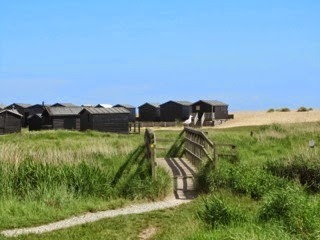 Beach HutsTara: Now let’s talk about your hero. What draws the heroine to him? Is he based on a real man in your life by any chance?
Beach HutsTara: Now let’s talk about your hero. What draws the heroine to him? Is he based on a real man in your life by any chance?
M.A.: Tom is a free spirit and loves the outdoors, he enjoys few things more than windsurfing or walking over the wild marshes, or up into the mountains in his beloved Greece. Fran is naturally attracted to such a kindred spirit. It is more than this however that draws her to him. He is naturally kind, fun to be with and genuinely interested in her rather than himself as so many men are! He makes her laugh and is a sensitive passionate lover.
No, he is not based on a real man in my life but perhaps a mixture of one or two that have been!
Tara: Your book takes place in London and Suffolk. If I were a tourist, what would you recommend I see in this town/country?
M.A.: The coastal marsh and countryside in Suffolk is unspoilt and beautiful. There are several nature reserves and Special Sites of Scientific Interest. Minsmere nature reserve near Dunwich is home to some of the rarest endangered birds in the country and well worth a visit. Konik horses have been introduced to the marsh to graze and bring it back to its natural habitat and Dartmoor ponies roam free in the forest.
Notting Hill, where some of my characters live, is a fantastic part of the City with pubs down cobbled streets and fashionable restaurants.
Tara: A more personal question. What’s the one thing you hope to accomplish before you die? Your main goal?
M.A.: I have been incredibly lucky and have accomplished many of the things I hoped to, but I know there will always more challenges and goals awaiting me, I am just waiting to see what, and that is what makes life exciting. I would love to become a successful author, create a wild flower meadow and swim with dolphins.
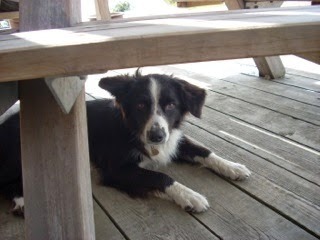 DottyTara: I've swam with dolphins. It's an amazing experience! Now I feel bad, 'cause a part of me feels they shouldn't be in captivity, but then again, they're safe. *sigh* I wouldn't trade the experience for anything though.
DottyTara: I've swam with dolphins. It's an amazing experience! Now I feel bad, 'cause a part of me feels they shouldn't be in captivity, but then again, they're safe. *sigh* I wouldn't trade the experience for anything though.
I’m a dog mom, so I always ask this. Do you have pets? If so, tell me about them and do provide pictures.
M.A.: I have a horse called Shadow, a dog called Dotty, and Pedro the cat.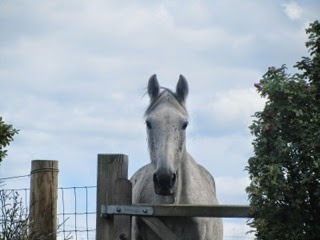 Shadow
Shadow
I ride regularly and Dotty comes too. Being a sheep dog she is very intelligent and just stays behind my horse if we go onto the lanes. When I go out kitesurfing and windsurfing she runs up and down the sandy beach and sometimes comes out for a little swim to check that I’m ok!
Tara: Thanks so much for joining us today. Best of luck to you with your book and any titles that follow. I love the cover, by the way!
***

M. A. Meadowcroft worked for the Marketing Director of a large finance company in London before having four children. She did a correspondence course in journalism and has been published in Kent Life and Windsurf Magazine. After qualifying as a windsurfing instructor she set up Rye Watersports by the Kent/Sussex coast. She spends the summer at her centre and winters writing and going to windy part of the world to pursue her love of watersports. She lives in an old farmhouse on the edge of the Romney Marshes. The Windsurf Girl is her first novel.
Readers, here's a blurb for you real quick:
 Fran is desperate to escape city life and her husband, who she suspects is having an affair. She flees with her little girl to a remote beach hut on the windswept shores of the Suffolk coast. When she is followed there by her brother, sister-in-law Annabel and the outrageously seductive Lydia, village life on the peaceful Suffolk marshes spirals into freefall.
Fran is desperate to escape city life and her husband, who she suspects is having an affair. She flees with her little girl to a remote beach hut on the windswept shores of the Suffolk coast. When she is followed there by her brother, sister-in-law Annabel and the outrageously seductive Lydia, village life on the peaceful Suffolk marshes spirals into freefall. While the locals are fighting their duels with each other and the London set, Fran rediscovers her passion for windsurfing through Tom, a windsurfer she watches out in the bay. But as she basks in the knowledge of his growing feelings for her, she is unaware of a long-hidden secret that is his bedfellow.
The story shifts between the hectic city and peaceful coast as Fran is thrown between both worlds. In London she is forced again into her husband's life of excess, with devastating consequences, and she finds herself drawn to the village of Warbleton and its colourful, quirky locals.
When Annabel discovers evidence of their husbands' corrupt dealings, the two women must take a gamble that could impact on the lives of everyone they hold dear in order to finally break free.
Inspired by authors from many eras and genres, The Windsurf Girl is a romantic tale with a fascinating heroine and an underlying theme of escapism. It will appeal to readers who enjoy a story of heartache, humour and hidden strengths.
M.A.: Time spent at my sister’s beach hut started me thinking about writing a story set in that area (Suffolk). I met lots of interesting characters there, and the glorious coast and countryside is inspiration in itself. The joy and exhilaration that’s experienced when windsurfing is incredible and so my main characters just had to love windsurfing! Tara: We focus a lot on heroines here on Book Babe. Tell me what makes your heroine(s) strong.
M.A.: Fran is definitely a strong heroine but in a quiet unforceful way. She faces adversity with great fortitude when confronted with betrayal on many fronts. As her world falls apart she keeps it together for the sake of her little girl and eventually moves on fearlessly towards a new life.Tara: Do you see any of yourself in her?
M.A.: Yes, there is a small part of myself that I see in Fran, which is being an incurable romantic!
Tara: What makes her sexy?
M.A.: Fran has a natural beauty which she is genuinely unaware of. This is incredibly attractive to men who don’t always like blatant sexiness. Her love of nature and ability to lose herself in the joy of the moment are other qualities that create her appeal.
Tara: What kind of research did you do when you penned this novel? Did anything surprising come up in your search?
M.A.: Because the main part of my book is set in Suffolk and it is totally fictitious I had no need to do any serious research. I loved learning more about Dunwich, the town lost to the sea, which is briefly mentioned in my book, but I already knew a lot of the history of the area through spending so much time there. The scam that Fran and Annabel’s husband were up to in the City needed a little research, but having worked in London for a few years I knew the basics of it. Not that anyone I knew did anything like that!
Tara: A town lost to the sea...ooh, that does sound intriguing.
What would you like readers to gain from reading your book? Is there a strong moral? Do you hope they will laugh, learn something, ponder a point?
M.A.: Ultimately I want my readers to go away feeling uplifted and happy, and if they are having any problems in their lives by reading my book they will feel better able to cope with them.
My novel is really a story of good against evil where the good characters outwit the baddies. It will definitely make people see how gratuitous self-indulgence and greed creates its own downfall.
I want anyone who seeks thrills and excitement to see these things can be found in windsurfing and kitesurfing or any challenging sport.
 Beach HutsTara: Now let’s talk about your hero. What draws the heroine to him? Is he based on a real man in your life by any chance?
Beach HutsTara: Now let’s talk about your hero. What draws the heroine to him? Is he based on a real man in your life by any chance?M.A.: Tom is a free spirit and loves the outdoors, he enjoys few things more than windsurfing or walking over the wild marshes, or up into the mountains in his beloved Greece. Fran is naturally attracted to such a kindred spirit. It is more than this however that draws her to him. He is naturally kind, fun to be with and genuinely interested in her rather than himself as so many men are! He makes her laugh and is a sensitive passionate lover.
No, he is not based on a real man in my life but perhaps a mixture of one or two that have been!
Tara: Your book takes place in London and Suffolk. If I were a tourist, what would you recommend I see in this town/country?
M.A.: The coastal marsh and countryside in Suffolk is unspoilt and beautiful. There are several nature reserves and Special Sites of Scientific Interest. Minsmere nature reserve near Dunwich is home to some of the rarest endangered birds in the country and well worth a visit. Konik horses have been introduced to the marsh to graze and bring it back to its natural habitat and Dartmoor ponies roam free in the forest.
Notting Hill, where some of my characters live, is a fantastic part of the City with pubs down cobbled streets and fashionable restaurants.
Tara: A more personal question. What’s the one thing you hope to accomplish before you die? Your main goal?
M.A.: I have been incredibly lucky and have accomplished many of the things I hoped to, but I know there will always more challenges and goals awaiting me, I am just waiting to see what, and that is what makes life exciting. I would love to become a successful author, create a wild flower meadow and swim with dolphins.
 DottyTara: I've swam with dolphins. It's an amazing experience! Now I feel bad, 'cause a part of me feels they shouldn't be in captivity, but then again, they're safe. *sigh* I wouldn't trade the experience for anything though.
DottyTara: I've swam with dolphins. It's an amazing experience! Now I feel bad, 'cause a part of me feels they shouldn't be in captivity, but then again, they're safe. *sigh* I wouldn't trade the experience for anything though.I’m a dog mom, so I always ask this. Do you have pets? If so, tell me about them and do provide pictures.
M.A.: I have a horse called Shadow, a dog called Dotty, and Pedro the cat.
 Shadow
ShadowI ride regularly and Dotty comes too. Being a sheep dog she is very intelligent and just stays behind my horse if we go onto the lanes. When I go out kitesurfing and windsurfing she runs up and down the sandy beach and sometimes comes out for a little swim to check that I’m ok!
Tara: Thanks so much for joining us today. Best of luck to you with your book and any titles that follow. I love the cover, by the way!
***

M. A. Meadowcroft worked for the Marketing Director of a large finance company in London before having four children. She did a correspondence course in journalism and has been published in Kent Life and Windsurf Magazine. After qualifying as a windsurfing instructor she set up Rye Watersports by the Kent/Sussex coast. She spends the summer at her centre and winters writing and going to windy part of the world to pursue her love of watersports. She lives in an old farmhouse on the edge of the Romney Marshes. The Windsurf Girl is her first novel.
Published on June 20, 2014 00:00
June 19, 2014
Song of The Spirits: Second Volume In New Zealand Family Saga
A half-Maori protagonist was enough to get me interested in Song of the Spirits by Sarah Lark. This is the second novel in a historical trilogy about a family composed of English descended colonists and Maori who inter-married during the 19th century. The novel was originally written in German and translated to English by D. W. Lovett. I won the book last year from the Goodreads Giveaway. The main reason why it has taken me so long to read and review this book is its length. I didn't have any way to fit it in my schedule while I was in library school. Since I need to take time off from library school, long sagas aren't so much of a problem for me.
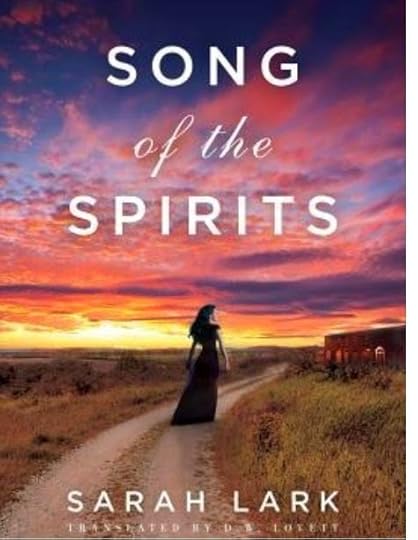
The half-Maori protagonist was certainly interesting, though I didn't think she matured as much as her cousin Elaine O'Keefe over the course of the narrative. Kura always knew what she needed from life and was very goal-focused. Sadly, other people only mattered if they were helping her to accomplish her goals and that never changed. Yet she was a highly gifted singer and musician who could summon Maori spirits with her flute and mesmerize audiences. Although Kura's main goal was an opera career, we learn something of Maori music in the process of following her adventures. There's a Maori Music You Tube that will give you the flavor of the type of music that Kura was trained in by her Maori mother. She was also trained in Western classical music and singing by an English governess. I was impressed by Kura's fortitude and belief in herself, but she could be quite ruthless toward anyone who stood in her way.
At the outset of this novel, Elaine O'Keefe didn't really know what she wanted. She went through a process of trial by ordeal that taught her what her true priorities were. Since Elaine was capable of caring very much about the people in her life, she is a more sympathetic character than Kura who easily discarded people without looking back.
I saw a review on Goodreads that accuses this author of creating male characters who were either misogynistic or weak. I think that William Martin, an Irish immigrant to New Zealand, is definitely an exception to this pattern. He grows during the course of the novel into a resourceful and heroic character that I very much respected. I also respected Timothy Lambert. He was thought to be weak by the people who surrounded him, but he managed to overcome the prejudices of his family. Yes, he needed help to do this, but it was actually his own knowledge and abilities that allowed him to finally achieve his ambitions. He just needed other people who were willing to give him a chance. Finally, Caleb Biller was a gay man who didn't want what society insisted that he should want. Yes, there were gay men who did turn their backs on social expectations during this period, but I don't think that readers who haven't been in Caleb's shoes have the right to disparage him as weak. He did manage to obtain some semblance of a life for himself within the limitations of the Victorian mindset.
So everyone who isn't a villain gets a chance to be happy. HEA is the name of that particular game, and I don't necessarily look down on HEA as some readers do. I think that it's a fine thing to imagine that justice triumphs and people get what they deserve. That's one of the reasons why I enjoy mysteries. Yet not all stories that end with HEA are equally satisfying. Sometimes the author has failed to convince me that the resolution would truly result in HEA for all concerned. That is the case with Song of the Spirits. I'm not actually convinced that Caleb will end up being truly happy with his situation, but I could be wrong. Yet he does seem to have more of a chance at happiness than he might have gotten otherwise.


The half-Maori protagonist was certainly interesting, though I didn't think she matured as much as her cousin Elaine O'Keefe over the course of the narrative. Kura always knew what she needed from life and was very goal-focused. Sadly, other people only mattered if they were helping her to accomplish her goals and that never changed. Yet she was a highly gifted singer and musician who could summon Maori spirits with her flute and mesmerize audiences. Although Kura's main goal was an opera career, we learn something of Maori music in the process of following her adventures. There's a Maori Music You Tube that will give you the flavor of the type of music that Kura was trained in by her Maori mother. She was also trained in Western classical music and singing by an English governess. I was impressed by Kura's fortitude and belief in herself, but she could be quite ruthless toward anyone who stood in her way.
At the outset of this novel, Elaine O'Keefe didn't really know what she wanted. She went through a process of trial by ordeal that taught her what her true priorities were. Since Elaine was capable of caring very much about the people in her life, she is a more sympathetic character than Kura who easily discarded people without looking back.
I saw a review on Goodreads that accuses this author of creating male characters who were either misogynistic or weak. I think that William Martin, an Irish immigrant to New Zealand, is definitely an exception to this pattern. He grows during the course of the novel into a resourceful and heroic character that I very much respected. I also respected Timothy Lambert. He was thought to be weak by the people who surrounded him, but he managed to overcome the prejudices of his family. Yes, he needed help to do this, but it was actually his own knowledge and abilities that allowed him to finally achieve his ambitions. He just needed other people who were willing to give him a chance. Finally, Caleb Biller was a gay man who didn't want what society insisted that he should want. Yes, there were gay men who did turn their backs on social expectations during this period, but I don't think that readers who haven't been in Caleb's shoes have the right to disparage him as weak. He did manage to obtain some semblance of a life for himself within the limitations of the Victorian mindset.
So everyone who isn't a villain gets a chance to be happy. HEA is the name of that particular game, and I don't necessarily look down on HEA as some readers do. I think that it's a fine thing to imagine that justice triumphs and people get what they deserve. That's one of the reasons why I enjoy mysteries. Yet not all stories that end with HEA are equally satisfying. Sometimes the author has failed to convince me that the resolution would truly result in HEA for all concerned. That is the case with Song of the Spirits. I'm not actually convinced that Caleb will end up being truly happy with his situation, but I could be wrong. Yet he does seem to have more of a chance at happiness than he might have gotten otherwise.

Published on June 19, 2014 00:00
June 18, 2014
Romancing the Rumrunner by Michelle McLean
 "If God had meant for us to go barreling toward each other at forty miles per hour we'd have been born with wheels on our feet."
"If God had meant for us to go barreling toward each other at forty miles per hour we'd have been born with wheels on our feet."It's a lady running a speakeasy and a P.I. determined to haul her in...thinking that she's really a he named The Red Phoenix.
She needs to keep her show running in order to pay off her dead father's debts, and he needs to bring her down to get in the Police Force's good graces again. What a conundrum!
Is there really any way for either one to come out on top?
I liked this story. It was an easy, uncomplicated read. I think there could have been more meat to it though. And I did expect a lady rumrunner to be a bit tougher.
What I liked was how the heroine realized being sexy/sensual is okay. She becomes aware of her own power.
"There was something incredibly empowering about striking a man dumb."
She grows in confidence too, thanks to singing onstage. I'm not sure if this was intended to be a big deal, but for some reason this really came off the page for me.
As the story continued though, some things began to irritate me or not sit well with me. Some of the things she does are just not explained, make no sense. Letting Tony into her booze room. How incredibly stupid. Her continuing to sing at his club when it becomes obvious she's not going to get anything out of it as far as "scoping the competition". On the contrary, she's hurting her own business. Her apparent unconcern with money one moment, then slumping with exhaustion the next because she's doing too much in order to pay back a mobster.
But what I really hated above all is how Tony got on her case for singing too sexy. To me, he implied that because of her sexy, sultry singing--which he'd warned her not to do--is the reason a man nearly attacks her. Like she's asking for it. He even warns her not to sing that way anymore, or he'll react.
Until that point, I actually liked Tony. This was a hero-killer for me.
Also disappointing to me is...well, she's a singer and she's up there singing sultry tunes... WHAT is she singing? I personally love the music and lyrics from the twenties and would have loved to have known what she was singing. Lyrics from those days, they are public domain, so share them with us! If you can't for some reason, make some up!
It also didn't have a strong twenties feel to it. Yea, they wear dresses with fringe, headbands, and sing in speakeasies, but beyond that...
I bought this on Amazon.

Published on June 18, 2014 00:00
June 17, 2014
The Oakdale Dinner Club by Kim Moritsugu
 You know those TV shows that you find yourself addicted to, even though you find them trashy? Perhaps it was Devious Maids? Or a daytime soap? I know I watched the first season of DM even though it was kinda trashy, all those people sleeping with others' spouses...but it was entertaining and funny, a guilty pleasure.
You know those TV shows that you find yourself addicted to, even though you find them trashy? Perhaps it was Devious Maids? Or a daytime soap? I know I watched the first season of DM even though it was kinda trashy, all those people sleeping with others' spouses...but it was entertaining and funny, a guilty pleasure.Like this book.
It didn't make me LOL, didn't make me cry, didn't really do anything but entertain me. But I couldn't stop reading. Despite the somewhat dryness of the writing--it doesn't really let you get "intimate" with any one character--I found myself invested in the stories. Who's going to be Mary Ann's fling? Is Danielle ever going to get out of the kitchen? And I found myself relating to many of the characters' issues, from a stalled marriage, to wanting to be alone, to not wanting to cook anymore because it's become such a chore. There's a lot going on here.
I must applaud the author for a great skill she shows in this novel. Normally when I pick up a story and it gives me 15 different characters and their backstories and current issues, I'll be lost. I won't remember who is who unless I write it all down. And while there were some odd moments I got confused between Kate or Alice and wait a minute--who the heck was Sarah again?, once the story picked up momentum, I knew who was who and who had done what with who. Each of the characters had such different personalities and traits.
I really liked Mary Ann and was cheering her on as she used a dinner party to socialize and meet her affair man. Trust me when I say, Mary Ann has every reason to be doing this. It's not the least offensive.
I found her very humorous, actually. She was the best part of the story. Her character and the things she said.
Long review short, I was addicted to this and it made for a quick read. Lots of drama, scandal, and it's really cool how a dinner party leads to so many different relationships formed--and not just sexual, but business opportunities, friendships, etc.
I'm not quite sure how the telepathy fit into anything though. Seemed out of place.
I received this via Netgalley.

Published on June 17, 2014 00:00
June 16, 2014
My Vintage Day, World War II "Experience"
I did something utterly exciting this last Friday. I went to Heber City, UT, where they were honoring the 70th Anniversary of D-Day. You all know my obsession with aircraft--all kinds!--and my strong interest in World War II. I certainly read enough novels about it!
So...I'm tickled pink to share with you all my day. I feel it's appropriate to share it here. I'm not on Facebook anymore either, so this gives me a way to share my pictures with those who are interested.
What did you do? you ask.
I went up in a B-25 called Maid in the Shade ! I sat in the back with the guns and we flew around for about twenty minutes. I've never in my life flown on a plane so very old with so much history behind it. This aircraft is a restored WWII plane that flew missions in 1944. It did a lot over Italy. I've taken a screen shot from the website. I encourage you to go look for yourself though; just click on the words Maid in the Shade up there.
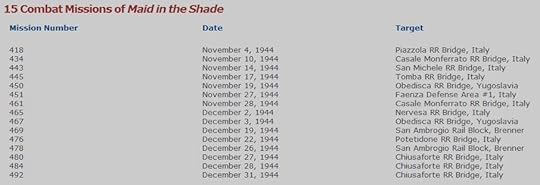
Anyway, here are some photos from the experience, outside and in. I must say, I loved the feel of this aicraft. It feels like you're in a plane. The rumble, the vibration. It's just too awesome for words. So much more exhilarating than modern-day aircraft. With modern-day ones, you pretty much forget you're in a plane.





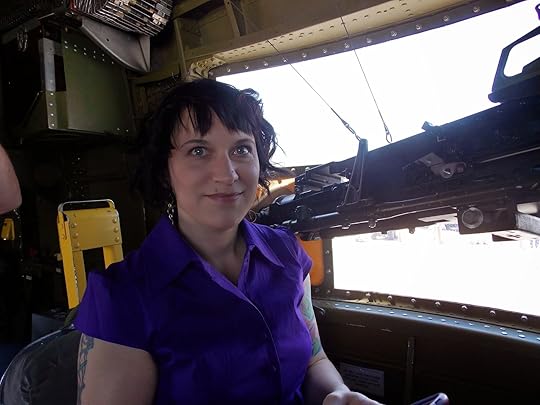 Inside! Finally! I'm terribly windblown at this point...and a bit frazzled...I'll get to that.
Inside! Finally! I'm terribly windblown at this point...and a bit frazzled...I'll get to that.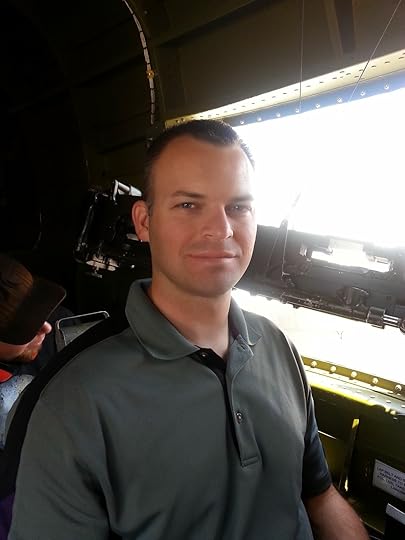 My generous and handsome hubby. No, ladies, you cannot have him.
My generous and handsome hubby. No, ladies, you cannot have him. Before we took off, the emergency exit was open, just a little circle of sheet metal.
Before we took off, the emergency exit was open, just a little circle of sheet metal.
 I was facing the cockpit. This was my view. I was sitting next to a gun, on the left.
I was facing the cockpit. This was my view. I was sitting next to a gun, on the left.I think what amazed me the most about this experience is all the people I know who had a hand in the life of this aircraft, the women in the factories who riveted them, the WASP who ferried them, the men who flied them over Italy, and the soldiers who sat in the seat you see wondering if they were going to die. We must remember to thank these people each and every day. Without them having fought the war, imagine what the world would be like now.
 Flying over Park City.
Flying over Park City.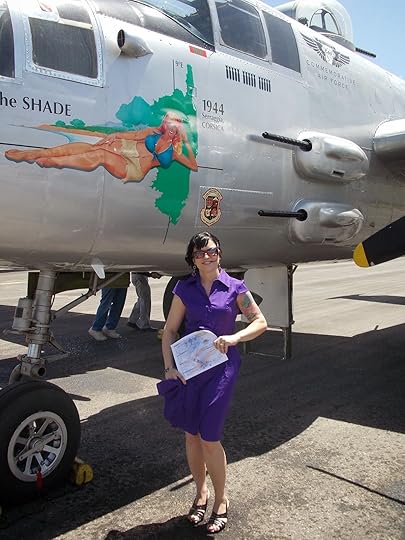 Me with my flight certificate. See how hard a time I'm having keeping my dress down? You see, I thought it was appropriate to wear one of my new vintage-style dresses... However, it was a LOT windier than I anticipated and I also had to...whilst holding my dress down, somehow climb up and down a ladder. *gulp*. Thank goodness I wore full-coverage underwear. Double thank goodness they were purple. It's not so bad if they match, huh? I'm fairly certain I flashed everyone there. UGH.
Me with my flight certificate. See how hard a time I'm having keeping my dress down? You see, I thought it was appropriate to wear one of my new vintage-style dresses... However, it was a LOT windier than I anticipated and I also had to...whilst holding my dress down, somehow climb up and down a ladder. *gulp*. Thank goodness I wore full-coverage underwear. Double thank goodness they were purple. It's not so bad if they match, huh? I'm fairly certain I flashed everyone there. UGH.Like the dress? Want the look for yourself? Find it on ModCloth, one of my favorite online dress shops. And no, this isn't a sponsored post or review. I bought and paid for this item myself and just thought I'd mention it.
 My certificate.
My certificate.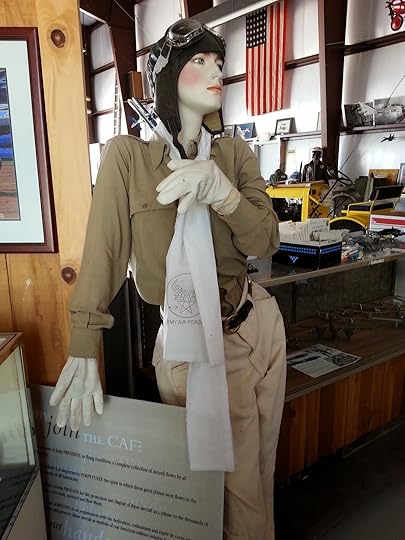 I, of course, had my feminine radar up and took photos of everything remotely womanly in the museum hangar.
I, of course, had my feminine radar up and took photos of everything remotely womanly in the museum hangar.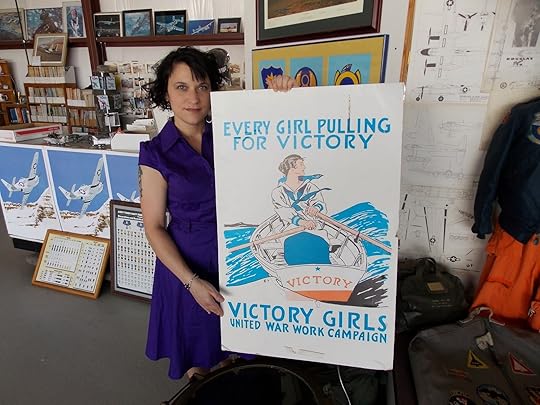
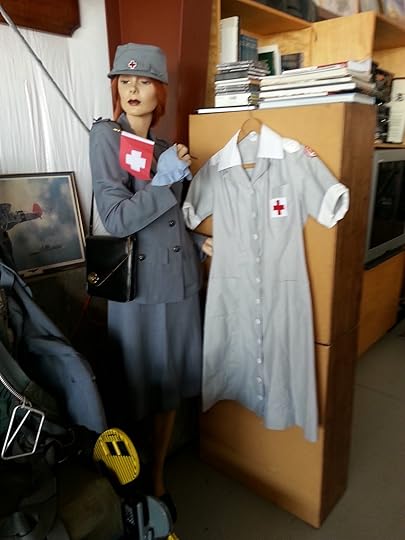
 When I saw this....I laughed. Had to take a picture, because this was me...all day. *smh*Funny fact I learned...you know those pin-up girls painted on the sides of the bombers to "boost morale"? Personally I think some of the nudies probably boosted other things...*snort* but of course, American women back then had delicate sensibilities--or so, men thought--and it turns out they were not allowed to pain those nudie girls on the sides of their aircraft until they were overseas.
When I saw this....I laughed. Had to take a picture, because this was me...all day. *smh*Funny fact I learned...you know those pin-up girls painted on the sides of the bombers to "boost morale"? Personally I think some of the nudies probably boosted other things...*snort* but of course, American women back then had delicate sensibilities--or so, men thought--and it turns out they were not allowed to pain those nudie girls on the sides of their aircraft until they were overseas. Anyway, that ends my Vintage WWII experience. Did anybody else do anything to honor WWII, D-day?
Published on June 16, 2014 00:00



